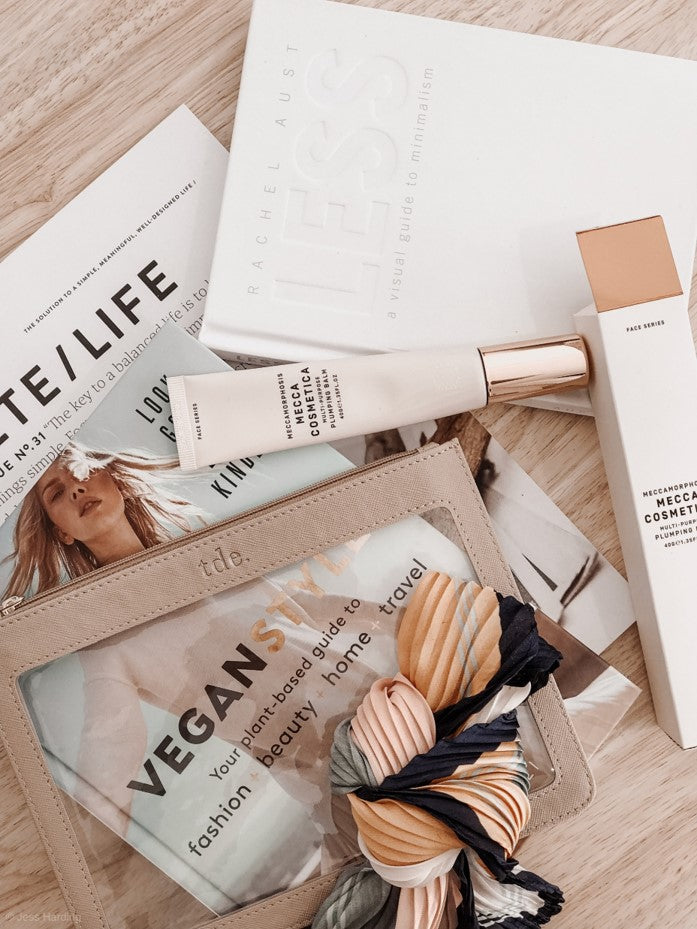When consumers shift to non-toxic, clean products, they often start off with cosmetics, clothing, and home goods. This is partly due to the influx of research being released about the toxic chemicals lurking behind these specific products. But people rarely consider the toxic load when they’re thinking about sex. Seeking out non-toxic sex toys, lubricants and condoms are just as important as any other product. We get it, “organic” doesn’t necessarily give off sexy vibes. But toxic chemicals and large carbon footprints aren’t really sexy either. Nontoxic bedroom essentials are a whole lot sexier, more luxurious, and fun. Harmful chemicals like parabens, phthalates, and BPA, are finding their way into your bedroom through products like condoms, lube, and sex toys. These chemicals are known endocrine disruptors and are linked to issues like ADHD, asthma, breast cancer, and reproductive health issues. Our sexual organs are mucous membranes that are as susceptible to these ingredients as our mouths. They absorb whatever we put in them and react accordingly. Not to mention, these products are often made of plastic and other non-recyclable materials that are harmful to the planet. Having high-quality sex products is kind of like putting high-quality gas in your car- everything will just run better. From biodegradable non-toxic sex toys to organic lubes, this article will provide products to turn up the heat in the bedroom without turning up the heat on the planet.
It’s time to detox your sex life.
This article will cover:
- Condoms
- What are the environmental and health concerns with condoms?
- Ingredients to Avoid
- Best Non-toxic Condoms
- Glyde
- Sustain Natural
- Lube
- What are the environmental and health concerns with lube?
- Ingredients to Avoid
- Best Non-toxic Lubes
- Good Clean
- Coconu
- Sex Toys
- What are the environmental and health concerns with sex toys?
- Ingredients to Avoid
- Best Non-toxic sex toys
- Gaia Eco
- We-Vibe
Condoms
What are the environmental and health concerns with condoms?
The FDA strictly regulates condoms, classifying them as class II medical devices. This has some benefits as certain chemicals are avoided and regulated, but there are still major environmental and health concerns. The FDA requires that all condoms be encased in plastic. This plastic casing is not biodegradable or recyclable and often contains BPA, a common chemical found in plastic. Another environmental concern is that almost all condoms are made from latex which also doesn’t biodegrade. After sex, people often though used condoms down the toilet. Never do this! It is bad for sewage and terrible for marine life. Find a film-plastic recycling program like TerraCycle to ensure your condoms and their packaging aren’t harming the environment. If you’re vegan, something to keep in mind is that most condoms use milk-derived casein to improve the texture of the latex. To avoid this, look for condoms that are certified vegan. You should also always avoid flavored condoms unless they specifically use natural, food-grade ingredients. Flavored condoms host a plethora of toxic dyes, fragrances and synthetic flavors. A main ingredient of concern is nitrosamine. Nitrosamine forms when liquid latex is heated up to the point at which it becomes solid and an accelerator is added to the mix to speed up the process. Look for brands that use a different manufacturing process that prevents the formation of nitrosamines. The best option is to pick condoms that have sustainable or fair-trade rubber sourcing and transparency about their ingredients and which chemicals they avoid.
Ingredients to Avoid
- Nitrosamines: a common ingredient in latex condoms that are linked to cancer
- Flavor or Fragrance: the term “artificial flavor” masks a combination of potentially harmful undisclosed ingredients
- Petroleum derived glycerin: can cause severe rashes and is harmful to the environment
- Siloxanes and Silanes: endocrine disruptors and extremely toxic to aquatic life
Best Non-Toxic Condoms
1. Glyde Ultra Thin Premium Condoms
$18
Glyde is the first certified non-toxic, fair trade condom! They are also the first and only condom certified vegan by the Vegan Society. They are considering vegan because they are free of casein, the dairy-derived ingredient I mentioned earlier that is common in most condom grades. Glyde condoms use non-GMO, fair trade natural rubber. Their products are free of glycerin, parabens, talc, and other harmful chemicals. Glyde is certified B Corp and is transparent about their fair trade labor practices. They offer a variety of sizes and even organic flavored condoms.
2. Sustain Natural Ultra Thin Latex Condoms
$17
Sustain condoms were a pioneer in the non-toxic sex life market. Their condoms are safe and trusted. Sustain condoms are non-GMO, vegan, fair-trade, and made from natural latex. Their rubber is sourced from a Forest Stewardship Council (FSC) certified plantation in Southern India. Their plantation even provides free medical facilities for workers and schools for their children. Along with sustainable sourcing, Sustain uses sustainable manufacturing. Their condoms are made in an award-winning environmentally friendly factory in Southern India. Sustain products are always hypoallergenic and free from synthetic dyes, fragrances, and nitrosamine
Lubricant
What are the environmental and health concerns with lube?
Although the FDA also regulates lubricants as a medical device, the regulation still allows for a significant amount of toxic chemicals to be used. Some of the same ingredients that are used in cars, antifreeze, and even oven cleaners are commonly used in lube. Gross! These ingredients include chemicals like glycerin, parabens, benzyl alcohol, and petroleum which are known to cause irritation and health concerns. Petroleum or petroleum-based ingredients used in lubricants are concerning because they interfere with the body’s natural ph levels. Lubes should be in the natural vaginal ph range of 3.8-4.5. This range is pretty much impossible to maintain with petroleum ingredients. Petroleum is especially common in flavored and warming sensation lubricants. Parabens are also extremely common and are used as a preservative. If you have ever had a lube that burns, itches, or feels sticky it is the result of parabens. Another ingredient of high concern is nonoxynol-9 which is a spermicide that kills both good and bad bacteria. This spermicide is common in lube and can cause abrasion and tears in the vagina as well as irritation and an increased chance of contracting an STD or getting an infection. Clearly, although the FDA does regulate lubricants, there is still a wide variety of toxic ingredients that we should try to avoid. As a general rule of thumb, avoid ingredients you can’t pronounce- you don’t want them coming in contact with your delicate vagina. Instead, opt for an organic aloe, water, or oil-based lube. Look for lubricants that avoid chemicals like glycerin and parabens and are certified organic. You can even make your own safe and effective natural lube with olive or coconut oil but be careful because oil-based lubes are often not compatible with latex condoms.
Ingredients to Avoid
- Propylene glycol and synthetic glycerin: petroleum-derived ingredients that can contribute to damaged rectal, cervical and vaginal tissues
- Parabens: preservative linked to breast cancer and reproductive harm
- PEGs: often contaminated with known carcinogens like 1,4 dioxane
- Artificial Flavor and Fragrance: undisclosed potentially harmful ingredients
- Siloxanes and Silanes: endocrine disruptors and extremely toxic to aquatic life
Best Non-toxic Lubes
1. Good Clean Love Almost Naked Organic Personal Lubricant
Good Clean Love lubricant is certified organic and the first carbon-neutral lubricant on the market! This product uses a water-based formula with organic aloe vera that closely mimics the body’s own natural lubricant. The ph rating is 4.1-4.5 meaning you won’t have to worry about offsetting your ph. It works with your body rather than against it. This lubricant is specifically formulated for internal use so that it doesn’t strip the vagina of moisture and won’t damage cells. Good Clean Love lube uses no petrochemicals, parabens, glycerin, or artificial fragrances. The water-based formula means it is safe to use with silicone toys and latex condoms. This lubricant is silky, smooth, and safe!
2. Coconu Oil Based Lubricant
$25
Coconu is an oil-based lube that is USDA-certified organic. Their formula consists of sunflower oil and coconut oil in combination with other organic ingredients. The formula is designed to moisturize dry tissues and stimulate your body’s natural lubricant. This product is hypoallergenic, cruelty-free, and GMO-free. Coconu lube uses no alcohol, petroleum, parabens, gluten, phthalates, fragrances, or dyes. In fact, this lube is so safe you can even eat it! That’s right, this lube is 100% edible. Coconu also offers water-based lube and hemp-infused body oil. If you’re looking for a super safe and effective lubricant, Coconu might be for you.
Sex Toys
What are the environmental and health concerns with sex toys?
Unlike condoms and lubricants, the FDA does not regulate sex toys. For the most part, the FDA does not consider them to be medical devices. This means there are no rules about what materials can be used and companies are not required to disclose any ingredients on the label. Sex toys are often full of similar toxic ingredients to those found in lube. Independent testing has revealed that sex toys contain even more chemicals than we expected including BPA, phthalates, polystyrene, toluene, cadmium, PVC, VOCs, and mineral oils. These chemicals are linked to hormone disruption, skin irritation, nausea, and cancer For example phthalates are commonly used to control the flexibility and durability of plastics used in sex toys, but they are linked to cancer and infertility. Phthalate-free is the bare minimum for safe sex toys. Aside from the use of chemicals, bacteria retention and environmental impact are also of high concern. Porous sex toys are capable of retaining harmful bacteria and are more likely to release harmful chemicals in the product. Always look for nonporous sex toys. Most sex toys are not recyclable and also use disposable batteries that pile up in landfills. Luckily rechargeable and biodegradable sex toys are hitting the markets. In fact, the first solar-powered fully recyclable vibrator is now available! It is easy to grab the cheapest vibrator. The world of sex toys can be overwhelming and expensive. But not doing the research can cause extreme harm to your body and sexual health. Especially if a product requires power, you should make sure it won’t cause lifelong damage. But don’t worry! There are affordable and effective non-toxic sex toys out there. You don’t have to compromise on pleasure to be safe and sustainable.
Ingredients To Avoid
- Polyvinyl Chloride (PVC): common ingredient often labeled as “jelly rubber” that leaches endocrine-disruptors
- Trimethyltin Chloride: used to manufacture PVC and is considered a reproductive hazard that is linked to neurotoxicity
- Phthalates: endocrine disruptors used to make plastic more flexible
- BPA: potentially harmful to brain and prostate glands and is linked to cardiovascular disease,
Best Non-toxic sex toys
1. Gaia Eco Biodegradable Vibrator
$16
Gaia Eco is the world’s first biodegradable vibrator! This non-toxic sex toy is made with non-porous, starch-based bioplastic. Gaia Eco is phthalate, fragrance, and latex-free. It is hypoallergenic and lab-certified to be safe for our bodies. It does not use a petroleum base and is safe with any lubricant. This vibrator is even waterproof! Gaia Eco offers multi-speed vibrations with an easy use twist dial. This vibrator comes in cute colors and a few different shapes and sizes. If you’re looking for an affordable, versatile, safe, and sustainable sex toy, Gaia Eco is the product for you.
2. We Vibe
$60-200
We-Vibe is the one-stop-shop for all your nontoxic sex toy needs. They offer an extensive amount of options for females, males, and couples. Although their products are a bit more pricey, they are super nice quality, highly recommended, and definitely worth the price. They have pretty much every shape, size, color, and type of vibrator you could imagine. All of their products are made with completely body-safe silicone and are always free from phthalates, BPA, and latex. All their products exceed strict consumer safety regulations, such as Europe's RoHS (Restriction of Hazardous Substances) and REACH (Registration, Evaluation, Authorization, and Restriction of Chemicals) directives, which restrict the use of hazardous materials such as lead, mercury, cadmium, various phthalates, and other substances. We-Vibe vibrators are also 100% waterproof making them durable and easy to clean. A lot of their products are super quiet so you can enjoy the fun without worrying about those around you. Their vibrators are also USB rechargeable which is both convenient and eco-friendly. Each product offers a huge variety of vibration modes so you are sure to find a non-toxic sex toy you love.
Sources:
https://www.chatelaine.com/health/pleasure-apps/
https://www.nontoxicrevolution.org/blog/toxin-free-sex-life
https://www.sheknows.com/health-and-wellness/slideshow/2110084/eco-friendly-sex-toys/9/
https://nutritiouslife.com/love-more/non-toxic-sex-toys/
https://www.thegoodtrade.com/features/natural-lube
https://nymag.com/strategist/article/best-organic-vegan-condoms-lube.html











